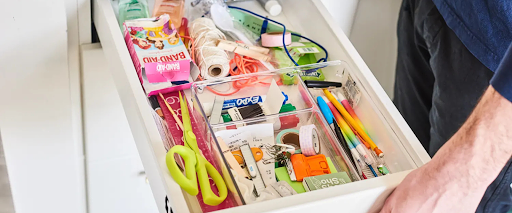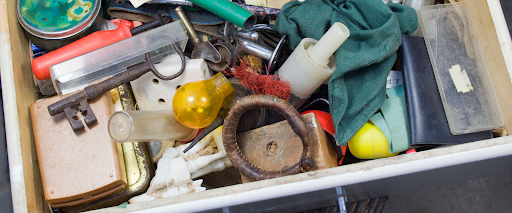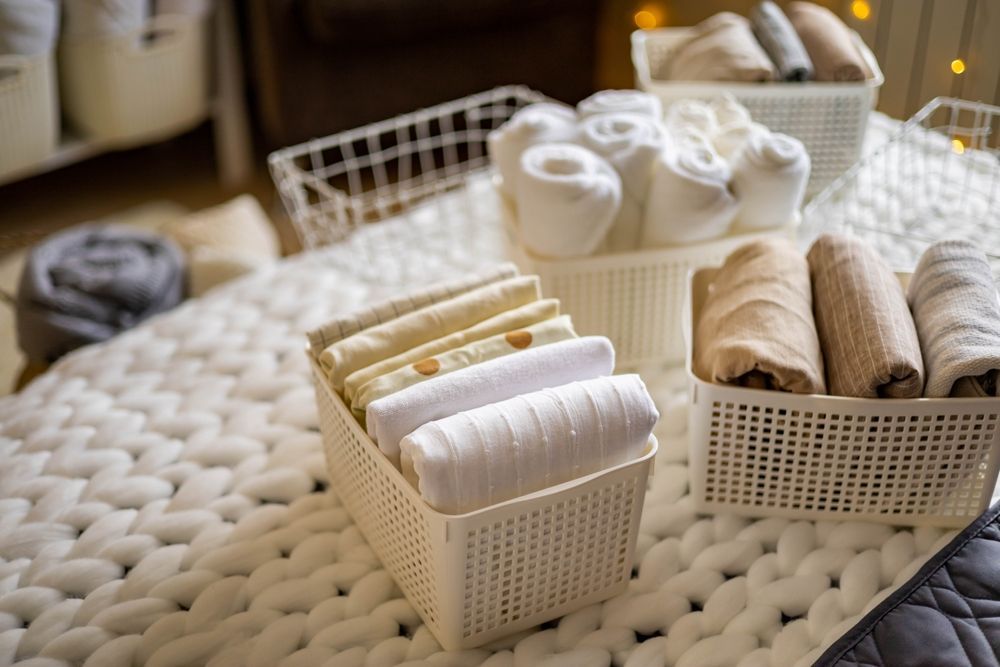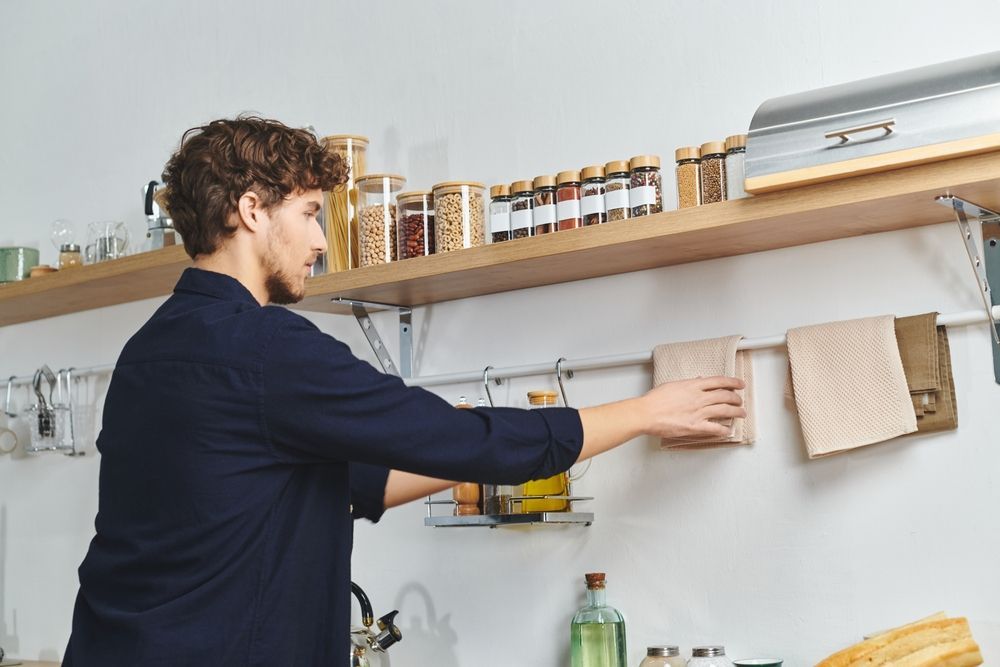How to Organize a Junk Drawer Like a Pro
Everyone has that one drawer where random items pile up, pens, batteries, rubber bands, and more. This “junk drawer” can quickly turn messy if you don’t manage it. The good news is, organizing it doesn’t have to be hard. With a few simple steps, you can turn clutter into a neat, functional space that makes finding things easy.
A tidy junk drawer saves time, reduces stress, and feels satisfying to use. This guide shares practical junk drawer ideas to help you create order. And if you need extra help, a
professional organizer can provide tips to keep it clutter-free for the long run.
Top Reasons Your Junk Drawer Needs a Makeover
A messy drawer can slow down your daily routine and add frustration. You dig through a pile of random things just to find a working pen. An organised junk drawer solves this by keeping everything easy to see and reach. When you give each item a place, you save time and avoid stress.
A tidy drawer also creates a sense of calm. Clean and organized spaces reduce stress and sharpen focus. A neat junk drawer inspires you to start organizing your home, from closets to
kitchen cabinets. Taking that small step often sparks a chain of bigger, more satisfying changes.
Step-by-Step Guide to Organizing Your Junk Drawer
These five steps provide a simple way to transform a messy drawer into a neat and functional space. Follow them consistently, and your junk drawer will stay organized for the long run.
Step 1: Empty and Sort Your Drawer
Start by emptying the junk drawer. Take everything out and place it on a table or countertop so you can see it all. You might be surprised by what you find, like an old charger or even a half-used pack of gum.
Next, sort the items into three piles: keep, toss, and relocate. Keep useful things you reach for often, such as pens, scissors, or batteries. Toss anything broken, expired, or unnecessary, like dried-out markers or old receipts. Relocate items that belong elsewhere, such as hair ties, to their designated locations, like the bathroom. Be strict and only keep what truly belongs in the drawer.
This simple sorting step is the key to small space organization and can even kickstart your own
decluttering checklist. By clearing out clutter, you make space for a system that actually works.
Step 2: Clean and Prepare the Drawer
Now that the drawer is empty, give it a quick clean. Wipe it down with a damp cloth to remove dust, crumbs, or sticky spots. A clean drawer feels fresh and motivates you to keep it organized. If the drawer has a liner, consider replacing it with a non-slip one to keep items in place.
While cleaning, think about how you’ll arrange things. Measure the drawer’s dimensions to ensure any drawer dividers or organizers you buy will fit. This prep work makes the next steps smoother and ensures your junk drawer stays functional.

Step 3: Choose the Right Drawer Dividers
Trying to organise a junk drawer without dividers is almost impossible; it quickly turns into chaos. Dividers are essential for small space organization because they create sections for different items. This keeps your pens separate from your batteries, paperclips, and other small things.
You can purchase affordable dividers at most stores, or create your own using small boxes or even ice cube trays for storing small items, such as thumbtacks. Adjustable dividers work well because you can change the layout to match your drawer and belongings.
Step 4: Group and Arrange Items Thoughtfully
Now it’s time to put everything back, but don’t just toss things in. Group similar items together, pens with pens, batteries with batteries, and so on. This makes it easier to find what you need. For example, keep all your writing tools in one divider and small electronics, such as earbuds, in another.
Place frequently used items toward the front for easy access. Less-used items, such as spare keys or a tape measure, can be stored at the back. If you have deep drawers, consider using stackable organizers to maximize your space. This approach not only keeps your junk drawer tidy but also introduces you to simple
home organization hacks that can make your life easier.
Step 5: Maintain Your Organized Junk Drawer
A tidy junk drawer won’t stay that way without a little effort. Make it a habit to check the drawer every month or two. Toss out anything new that doesn’t belong, like random receipts or broken items. If you add something new, ensure it integrates seamlessly with your existing system.
Another tip is to label your drawer dividers if you’re worried about things getting mixed up. For example, a small label for “batteries” or “office supplies” can keep everyone in the household on the same page. Regular upkeep ensures your junk drawer stays a model of small space organization and supports a more well-organized home.
Junk Drawer Ideas to Personalize Your Space
Want to take your junk drawer to the next level? Adding personal touches makes it both practical and uniquely yours. Here are some simple ideas to try:
- Add color and style: Use colorful dividers or line the drawer with patterned contact paper to make it visually appealing.
- Repurpose small containers: Store tiny items like buttons, earrings, or thumbtacks in repurposed containers such as Altoid tins or small boxes.
- Create a “quick grab” section: Keep your most-used items, like a favorite pen or small notepad, in an easy-to-reach spot.

Common Mistakes to Avoid
It’s easy to make mistakes when organising a junk drawer. Here are the most common ones and how to avoid them:
- Keeping too much stuff: If you struggle to let go, ask yourself, “Have I used this in the last six months?” If the answer is no, it likely doesn’t belong in the drawer.
- Skipping dividers: Without dividers, your drawer will quickly slide back into chaos.
- Overcomplicating the system: You don’t need dozens of tiny compartments if you only store a few types of items. Keep your system simple.
FAQ
What are the best junk drawer ideas for small spaces?
For small drawers, use adjustable drawer dividers to create custom sections. Stackable organizers or small containers, such as pillboxes, work well for storing tiny items. Keep only essentials to avoid overcrowding.
How often should I reorganize my junk drawer?
Check your drawer every one to two months. Toss out junk, relocate misplaced items, and adjust your setup if needed. This keeps your small space organization system working smoothly.
Can drawer dividers fit in any drawer?
Most dividers are adjustable or come in various sizes, so measure your drawer first. DIY options, like cut-down cardboard or small boxes, can also work for odd-shaped drawers.
How do I stop my junk drawer from getting messy again?
Use drawer dividers and assign a place for every item. Regularly declutter and avoid tossing random stuff in. A quick monthly check keeps your organized living on track.
Enjoy Your Clutter-Free Junk Drawer
Transforming your junk drawer from a cluttered mess to an organized masterpiece is easier than you think. By sorting, cleaning, using drawer dividers, and maintaining a simple system, you create a space that’s both functional and stress-free. Every time you open that drawer and find precisely what you need, you’ll feel a little burst of satisfaction.
Take a moment to appreciate how this small project can inspire bigger changes in your home. A tidy drawer is just the start; use these tips to bring order to other spaces, too.
Contact a professional home organization expert for personalized solutions to create a clutter-free space you’ll love.










